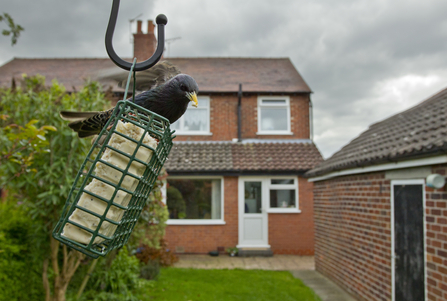Bowls of everyday items found in kitchen cupboards such as suet, peanuts, seeds, apples and dried fruit, plus bowls of fresh water, will really help many birds and small mammals survive the winter.
In addition, there’s good news for people who can’t face the cold as gardening for wildlife offers a great excuse to sit back and do nothing until spring.
During the colder months, an outdoor space such as a garden or back yard can be a safe haven for birds, insects and hedgehogs.
One of the best ways to offer shelter is to create habitats in the sunniest, most sheltered spot. A stack of bricks and pots will provide a home for toads and newts while sticks and logs are great for hedgehogs and insects.
Bees in particular love wood with lots of little hidey-holes left in a sunny place. Rotting wood is a valuable part of the ecosystem and, if left, could become home to beetles, centipedes, spiders and fungi. Old flower stems in flowerbeds and pots also provide much needed food for insects.
Another tip to help wildlife through colder months is to leave gardens undisturbed until the spring. Uncut grass is a perfect for frogs and mice and leaves piled up are full of nutrients and great for hedgehogs, worms, mini-beasts, frogs and toads
The wildlife charity is also urging people to go easy with the clippers and not cut back hedges when they are producing berries, as they are a valuable food source for birds and mammals when there is nothing else around for them to eat. Likewise, ivy is important for bees and butterflies as it flowers in the autumn and becomes a valuable source of nectar before they go into hibernation. It also offers a safe hideaway for small mammals.
Even the corners of a dusty shed may have butterflies overwintering in them, or a sunny wall may be a cosy haven bees or ladybirds.
Duncan Hutt, Director Conservation at Northumberland Wildlife Trust says: “Gardens are a vital source of shelter and food for wildlife, especially in winter when many species need warm, dry spaces to bed down in.
“When you are out in your garden this autumn, why not take it easy and hold back on some projects until spring? You never know, you may be rewarded with visits from some wonderful species, as well knowing you are making a positive contribution to wildlife and the environment.”

